Transport for London is raising the Congestion Charge in the capital by 20 per cent from next year, it revealed today.
Drivers in Central London will be required to fork out £18 per day from January 2026, up from the £15 charge currently in place. It’s the first hike since 2020.
And in a snub to those hoping to move to the congestion zone – which runs from Mayfair to Tower Bridge east to west and from Euston Road in the north to Vauxhall in the south – discounts for petrol and diesel cars will also be scrapped.
TfL says the increase will ‘help keep London moving, encourage the uptake of electric vehicles and promote sustainable travel across the capital’.
However, many drivers in the capital will view it as another effort by London Mayor Sadiq Khan to profit off the back of motorists while attempting to force them off the road entirely.
The rise means the daily cost of driving an older car in the capital – when combined with the £12.50 Ultra-Low Emission Zone charge – will amount to an eye-watering £30.50.
TfL claims – referencing an Inrix report published earlier this year – that in 2024 alone, congestion in London cost the capital £3.85billion is lost earnings as drivers spent an average of 101 hours stuck at a standstill in jams or in slow-moving traffic.
It has launched a consultation on the proposed changes starting today and running until August for Londoners to share their views.
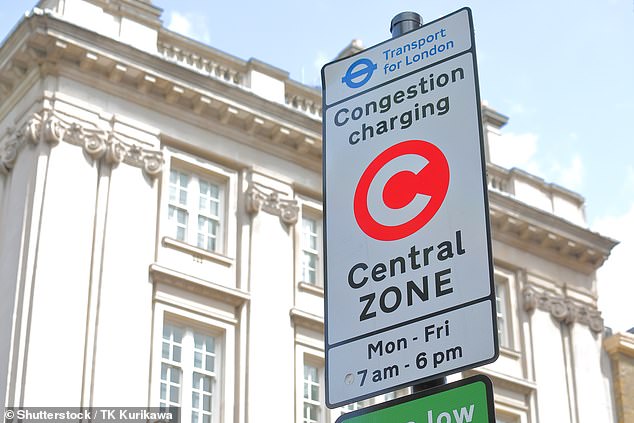
Transport for London will hike the Congestion Charge in the capital by 20% to £18-a-day from next year. And the cost could increase annually thereafter under proposals outlined today
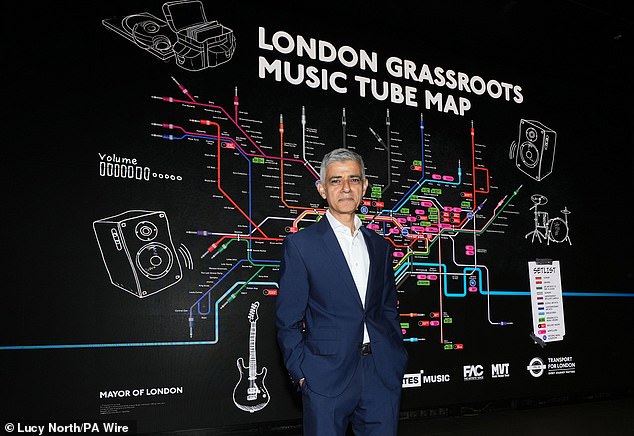
TfL says the increase will ‘help keep London moving’ – but has been attacked by the Federation of Small Businesses as ‘swingeing’
London’s transport department said congestion in the capital continues to ‘heavily impacts businesses, bus customers and other essential services,’ as it outlined its reasons to enforce an increase in the Congestion Charge.
It went on to defend the move by saying the 20 per cent rise is below the inflation increase for the period since the charge was last hiked.
When the charge was previous raised in June 2020 it jumped by 30 per cent from £11.50.
And the cost could rise annually from now on, TfL revealed, while keeping to Sadiq Khan’s pledge to fix the daily ULEZ fee at £12.50.
Its plans unveiled on Tuesday morning also include a proposal to increasing the price of the Congestion Charge annually in line with Tube fares, which is currently inflation plus 1 per cent or a lower amount.
These increases would only apply to the Congestion Charge and not the ULEZ.
TfL says that without the increase from next year, an additional 2,200 vehicles would use the Congestion Charging Zone (CCZ) on average per day, which would increase financial losses and impact the city’s air pollution targets.
The public consultation – which ends on 4 August – said the rise in the cost of the charge will help achieve the ‘Mayor’s long-term vision for a cleaner, greener London, through increased uptake in electric vehicles and more journeys taken by public transport’.
The price increase will take effect from 2 January 2026.
If the charge is not paid within 48 hours, drivers face a penalty of £180, reduced to £90 if paid within 14 days.
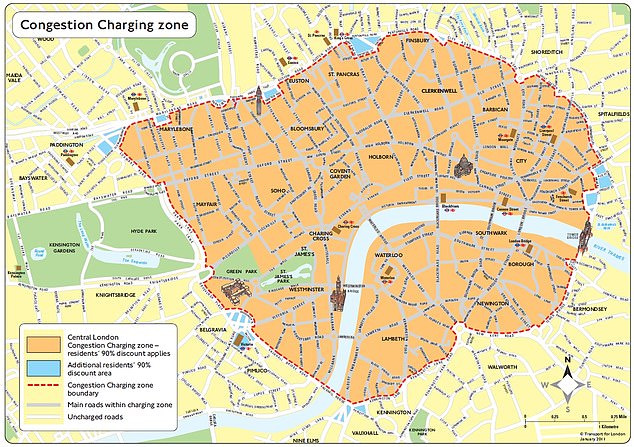
The Zone covers approximately the area from Kings Cross in the north to Vauxhall in the south, and Paddington in the west to Whitechapel in the east. It was introduced in 2003 by Ken Livingstone
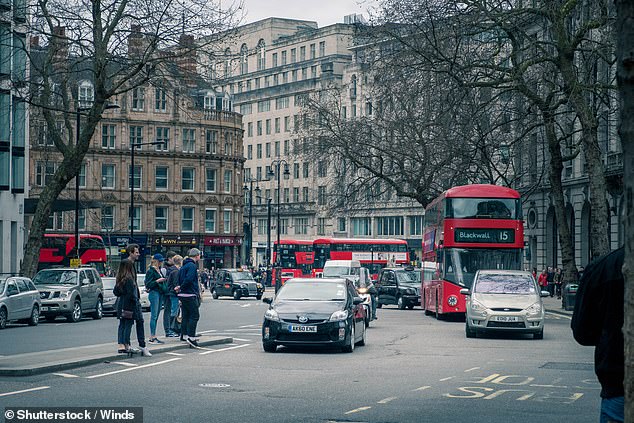
Next year’s rise means the daily cost of driving an older car in the capital – when combined with the £12.50 Ultra-Low Emission Zone charge – will amount to an eye-watering £30.50
Drivers of electric cars, who currently travel free in the Zone, were due to start paying the full charge from December.
However, the consultation includes a 25 per cent discount for EV owners, down to £13.50 per day, provided they are registered for auto pay. Eco-friendly HGVs receive a 50 per cent discount, as do electric vans.
The van discount, TfL said, would reflect the fact that some journeys are ‘harder’ to make by other means such as walking, cycling and public transport.
From 2030, both discounts will be halved, with a 12.5 per cent saving for electric car drivers and 25 per cent discount for HGV operators.
The Federation of Small Businesses (FSB) told the BBC it viewed the rise as ‘swingeing’ at a time when ‘small firms are making extremely tough business decisions to remain competitive’.
The consultation also includes scrapping the 90 per cent residents’ discount for new residents living within the CCZ boundary and driving petrol and diesel cars.
Existing residents will hold onto their discounts, it is understood – but new residents in the area will only be eligible to receive a 90 per cent discount if their car is electric.
‘This will help to incentivise the shift to the cleanest possible vehicles and give people moving into the zone time to plan ahead,’ TfL said.
It added: ‘Those who are already registered for the discount ahead of this date will not see any changes, reflecting that they might be reliant on their current form of transport.’
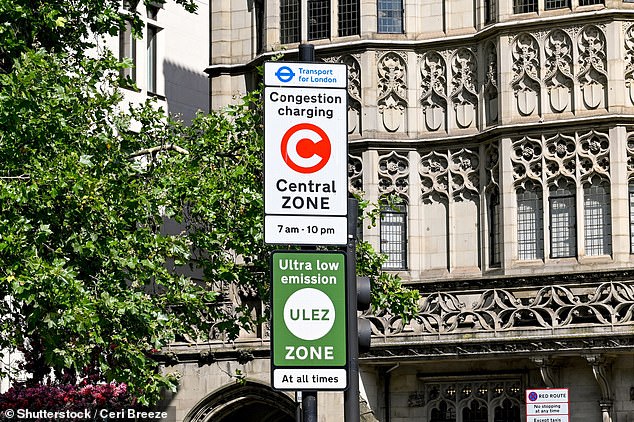
Drivers of electric cars, who currently travel free in the Congestion Charge Zone, were due to start paying the full charge from December. However, the consultation includes a 25% discount for these motorists from 2 January 2026
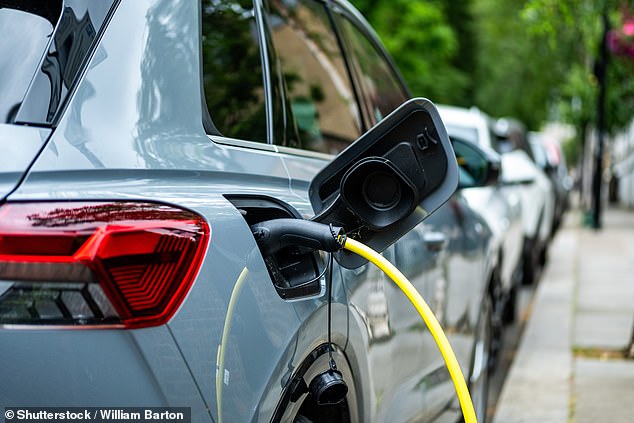
Existing residents within the zone will hold onto their discounts – but anyone moving to the area after March 2027 will only be eligible for one if they drive an electric car
Seb Dance, Deputy Mayor for Transport, said: ‘Keeping London moving by reducing congestion is vital for our city and for our economy.
‘The congestion charge has been a huge success since its introduction, but we must ensure it is fit for purpose.
‘Sticking to the status quo would see around 2,200 more vehicles using the congestion charging zone on an average weekday next year.
‘At the same time we must support Londoners and businesses to use greener and more sustainable travel. That’s why I’m pleased we’re proposing that substantial incentives remain in place for Londoners who switch to cleaner vehicles.
‘We encourage everyone to have their say and respond to the public consultation.’
Christina Calderato, TfL’s Director of Strategy, added: ‘Since it was introduced in 2003, the Congestion Charge has been hugely successful in supporting the move to more walking, cycling and public transport and encouraging the uptake of the cleanest vehicles.
‘With these proposed changes we want to make sure it continues to be effective in managing traffic and congestion in central London while providing ongoing support to those who need to drive in the zone to make the switch to an electric vehicle.’
The CCZ was originally introduced on 17 February 2023 under Ken Livingstone and cost £5.
The Zone covers approximately the area from Kings Cross in the north to Vauxhall in the south, and Paddington in the west to Whitechapel in the east.
All roads around the perimeter of the zone are enforced by Automatic Number Plate Recognition cameras.
The charge was doubled to £10 in 2010 and rose again in 2014 to £11.50.
During the Covid-19 pandemic outbreak in early 2020, TfL implemented a ‘temporary’ price increase to £15. However, by June the same year, the increase was made permanent as part of a funding agreement between the Government and TfL.
The charge applies seven days a week between 7:00am and 18:00pm Monday to Friday; and 12:00 to 18:00 Saturday to Sunday (and bank holidays).
There is no charge between Christmas Day and New Year’s Day.












